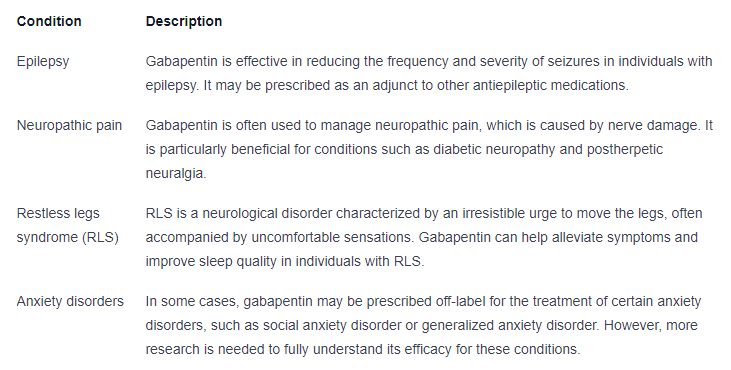Can Gabapentin Cause Depression?

Understanding Gabapentin
To navigate the concerns surrounding the potential link between gabapentin and depression, it is important to first have a clear understanding of what gabapentin is and its common uses.
What is Gabapentin?
Gabapentin is a medication that belongs to the class of drugs known as anticonvulsants. Originally developed to treat epilepsy, gabapentin is also prescribed for various other medical conditions, including neuropathic pain, restless legs syndrome, and certain types of seizures.
Gabapentin works by affecting the activity of certain chemicals in the brain, specifically the neurotransmitter gamma-aminobutyric acid (GABA). By increasing the levels of GABA, gabapentin helps to reduce abnormal electrical activity in the brain, which can lead to seizures or neuropathic pain.
Common Uses of Gabapentin
Gabapentin is commonly prescribed for the following conditions:

It's important to note that the use of gabapentin should always be under the guidance and supervision of a healthcare professional. They will assess the individual's specific condition, medical history, and other factors to determine the appropriate dosage and duration of treatment.
Understanding the purpose and common uses of gabapentin provides a foundation for exploring any potential links between gabapentin and depression.
Exploring the Link Between Gabapentin and Depression
Gabapentin is a medication commonly used to treat various conditions such as epilepsy, neuropathic pain, and restless leg syndrome. However, concerns have been raised about the potential link between gabapentin use and depression. In this section, we will delve into this topic to provide a clearer understanding.
Can Gabapentin Cause Depression?
The relationship between gabapentin and depression is a complex one, and it is important to note that not everyone who takes gabapentin will experience depressive symptoms. However, some individuals may experience changes in mood while using this medication. It is essential to be aware of this possibility and to monitor any mood changes closely.
Research and Studies on Gabapentin and Depression
Research regarding the association between gabapentin use and depression is still ongoing. While some studies suggest a potential link, others have found no significant evidence supporting a direct causal relationship. It is important to consider these findings within the context of individual variations and reactions to the medication.
One study conducted on individuals with neuropathic pain found that gabapentin use was associated with a higher risk of depressive symptoms compared to a control group. However, it is worth noting that this study focused on a specific population and may not necessarily apply to individuals using gabapentin for other conditions.
Another study explored the use of gabapentin as an adjunctive treatment for bipolar disorder and found no significant increase in depressive symptoms. This suggests that the relationship between gabapentin and depression may vary depending on the underlying condition being treated.
It is essential to consult with your healthcare provider if you have concerns about the potential impact of gabapentin on your mood. They can provide personalized advice based on your specific medical history and help you weigh the potential benefits against the risks.
Understanding the possible link between gabapentin and depression requires considering individual variations, the dose and duration of gabapentin use, as well as other factors that may contribute to changes in mood. Open communication with your healthcare provider is key to monitoring and managing any potential side effects effectively.
Factors to Consider
When evaluating the relationship between gabapentin and depression, it is important to consider various factors that can influence an individual's response to this medication. Two key factors to consider are individual variations and reactions, as well as the dose and duration of gabapentin use.
Individual Variations and Reactions
Every person is unique, and their response to medications can vary. While some individuals may experience depressive symptoms while taking gabapentin, others may not. It is crucial to recognize that the impact of gabapentin on mental health can differ from person to person.
Factors such as underlying medical conditions, genetic predispositions, and personal susceptibility to mood changes can contribute to the variation in individual reactions. It is always recommended to consult with a healthcare provider to assess personal risks and benefits before starting or adjusting any medication regimen.
Dose and Duration of Gabapentin Use
The dose and duration of gabapentin use can also play a role in the potential development of depressive symptoms. It is important to note that gabapentin is typically prescribed for various medical conditions, including epilepsy, neuropathic pain, and restless legs syndrome. The dosage and duration of treatment can vary based on the specific condition being treated.
In some cases, higher doses of gabapentin may be associated with an increased risk of adverse effects, including changes in mood. Similarly, long-term use of gabapentin could potentially impact mental health. However, it is vital to remember that these effects can differ among individuals.
To better understand the relationship between gabapentin, depression, and other potential side effects, it is essential to consult with a healthcare provider. They can provide personalized guidance based on individual medical history, medication regimen, and treatment goals.
By considering individual variations and reactions, as well as the dose and duration of gabapentin use, healthcare providers can make informed decisions about the use of gabapentin and monitor for potential adverse effects. It is crucial for individuals taking gabapentin to communicate openly with their healthcare provider to ensure the best possible care and management of their overall well-being.
Other Potential Side Effects of Gabapentin
While the focus of this article is on the potential link between gabapentin and depression, it's important to be aware of other possible side effects that may arise from gabapentin use. These side effects can vary in their frequency and severity. Here, we will discuss both common and less common side effects associated with gabapentin.
Common Side Effects
Common side effects are those that are more frequently reported by individuals taking gabapentin. It's important to note that not everyone will experience these side effects, and their occurrence may vary from person to person. Some common side effects of gabapentin include:
Side Effect
Drowsiness
Fatigue
Dizziness
Headache
Nausea
It's worth mentioning that these side effects are generally mild and tend to improve over time as the body adjusts to the medication. However, if any of these side effects persist or worsen, it is advisable to consult a healthcare provider for further guidance.
Less Common Side Effects
Less common side effects are those that occur infrequently but have been reported by some individuals using gabapentin. These side effects are typically more rare and may require medical attention if they occur. Some less common side effects of gabapentin include:
Side Effect
Mood changes
Anxiety
Confusion
Blurred vision
Swelling in the extremities
While less common, these side effects should still be taken seriously. If any of these side effects occur or worsen, it is important to seek medical advice promptly.
It's important to note that this is not an exhaustive list of all possible side effects associated with gabapentin. If you are experiencing any symptoms or side effects that concern you, it is recommended to consult a healthcare provider. They can provide personalized guidance and support based on your specific situation.
Understanding the potential side effects of gabapentin is crucial in making informed decisions about its use. By being aware of the common and less common side effects, individuals can better monitor their own well-being and seek appropriate medical attention if needed.
Seeking Professional Guidance
If you have concerns about the potential link between gabapentin and depression, it is important to seek professional guidance. Consulting with healthcare providers and closely monitoring and managing any side effects can help ensure your well-being.
Consultation with Healthcare Providers
When considering the use of gabapentin or if you suspect that gabapentin may be causing depressive symptoms, it is crucial to consult with your healthcare provider. They can provide valuable insights and guidance based on your individual health history and circumstances.
During your consultation, be prepared to discuss your symptoms, medical history, and any medications or supplements you are currently taking. Your healthcare provider may ask you questions to better understand your concerns and determine the most appropriate course of action.
It is essential to be open and honest about your experiences and any changes you have noticed since starting gabapentin. This information will enable your healthcare provider to make informed decisions regarding your treatment plan and address any potential concerns.
Monitoring and Managing Side Effects
Monitoring your response to gabapentin treatment and managing any side effects is a crucial aspect of seeking professional guidance. Your healthcare provider will work closely with you to assess your progress and address any concerns that may arise.
Regular follow-up appointments will allow your healthcare provider to evaluate your response to gabapentin and monitor for any potential side effects, including depressive symptoms. This ongoing monitoring helps ensure that your treatment remains safe and effective.
If you experience any new or worsening symptoms, such as depression or changes in mood, it is important to notify your healthcare provider promptly. They can help determine whether these symptoms are related to gabapentin or other factors, and make any necessary adjustments to your treatment plan.
Remember, healthcare providers are trained professionals who are equipped to address your concerns and provide appropriate guidance. Seeking their expertise is essential for understanding the potential link between gabapentin and depression and ensuring your overall health and well-being.
By consulting with healthcare providers and actively monitoring and managing any side effects, you can navigate the concerns surrounding gabapentin and make informed decisions about your treatment.
Conclusion
Gabapentin is a medication that can provide relief for various medical conditions, including epilepsy, neuropathic pain, and restless leg syndrome. While concerns have been raised about the potential link between gabapentin use and depression, research on this topic is still ongoing. It is important to recognize that individual variations and reactions, as well as the dose and duration of gabapentin use, can influence an individual's response to this medication.
If you are taking gabapentin or considering its use, it is essential to communicate openly with your healthcare provider and monitor for any potential side effects closely. Seeking professional guidance can help ensure that your treatment remains safe and effective. By being aware of the possible side effects associated with gabapentin and seeking appropriate medical attention when needed, individuals can make informed decisions about their overall well-being.
